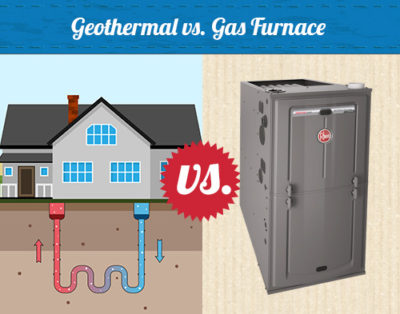“Abe's Heating and cooling were professional and on time. they helped me with two time sensitive projects and did excellent work. I know who I'll be calling if I should ever need an HVAC technician.”
Blog
 When it’s time to replace your existing furnace how do you know whether a geothermal heat pump or a high-efficiency gas furnace is the best option for your home? Here is an overview, as well as the pros and cons of each, to give you a clearer picture.
When it’s time to replace your existing furnace how do you know whether a geothermal heat pump or a high-efficiency gas furnace is the best option for your home? Here is an overview, as well as the pros and cons of each, to give you a clearer picture.
Geothermal heat pumps use the Earth as a source of naturally occurring heat to warm your home in the winter or to transfer heat from your home in order to cool it in the summer. Heating and cooling is accomplished with a closed-loop system consisting of a narrow pipe that circulates water below ground. The water transfers heat from the Earth to your home or vice versa. Because the temperature below ground is fairly constant all year long — roughly 55 degrees Fahrenheit — regardless of the air temperature and requires no fuel to generate energy for heating or cooling, this is a highly efficient system.
A geothermal system is much more expensive to install than a gas furnace. A horizontal loop is less expensive than a vertical loop, so if space allows, a horizontal loop is preferable.
Once the system is in place, however, there is no need to purchase fuel for heating or cooling. It utilizes clean, renewable energy that doesn’t harm the environment or cause health problems. Tax incentives are also available in most places to offset the initial cost.
The indoor equipment required for a geothermal system lasts 25 years or more. The outdoor equipment lasts for 50 years or more.
A gas furnace burns fuel to create thermal energy, then distributes it throughout the home. Creating energy is less efficient than transferring energy. Even high-efficiency furnaces cannot turn 100% of the fuel burned into heat, and some heat is lost through transmission.
The installation cost for a new gas furnace is significantly less than a geothermal system. Once installed, however, you will still have to purchase fuel (natural gas or propane). A new high-efficiency furnace will be more efficient and cost-effective than an older furnace, but it will never be as efficient as a geothermal system.
A typical gas furnace needs to be replaced after 15 to 20 years.
What type of system is right for you? Contact ABE Heating and Cooling today for information and answers to your questions. We are located in Brighton, Colorado, and serve the entire Denver Metro Area.